How to Get Rid of Anxiety at Night
*This article is for general information purposes only and is not intended as medical or other professional advice. Visit the links within the text for sources. Casper has not independently verified the sources.
While some of us may toss and turn some nights, every night can be a restless night for others. If you've ever struggled with sleep anxiety, you know the feeling of anxiously watching the clock as you worry about not being able to fall asleep and waking up sleep-deprived the next day.
There are many statistics that reveal Americans' struggle to sleep on a regular basis. As it turns out, anxiety and sleep are connected in a number of ways. Fifty percent of those who are sleep-deprived say that their anxiety impacts their ability to sleep at night.
It's important to understand how anxiety can affect your ability to get a good night's rest. This guide covers what sleep anxiety is, the effects of anxiety-induced sleep deprivation, and science-backed tips for decreasing anxious thoughts, as well as how to set yourself up for better sleep.
What Is Sleep Anxiety?
Sleep anxiety is a type of performance anxiety that involves a cycle of anxious thoughts before going to bed, many of which involve unease, nervousness, and worry. While there are dozens of tasks to occupy your cognitive functions during the day, your brain can often struggle to keep itself busy at night, thus resorting to any anxious emotions and thoughts.
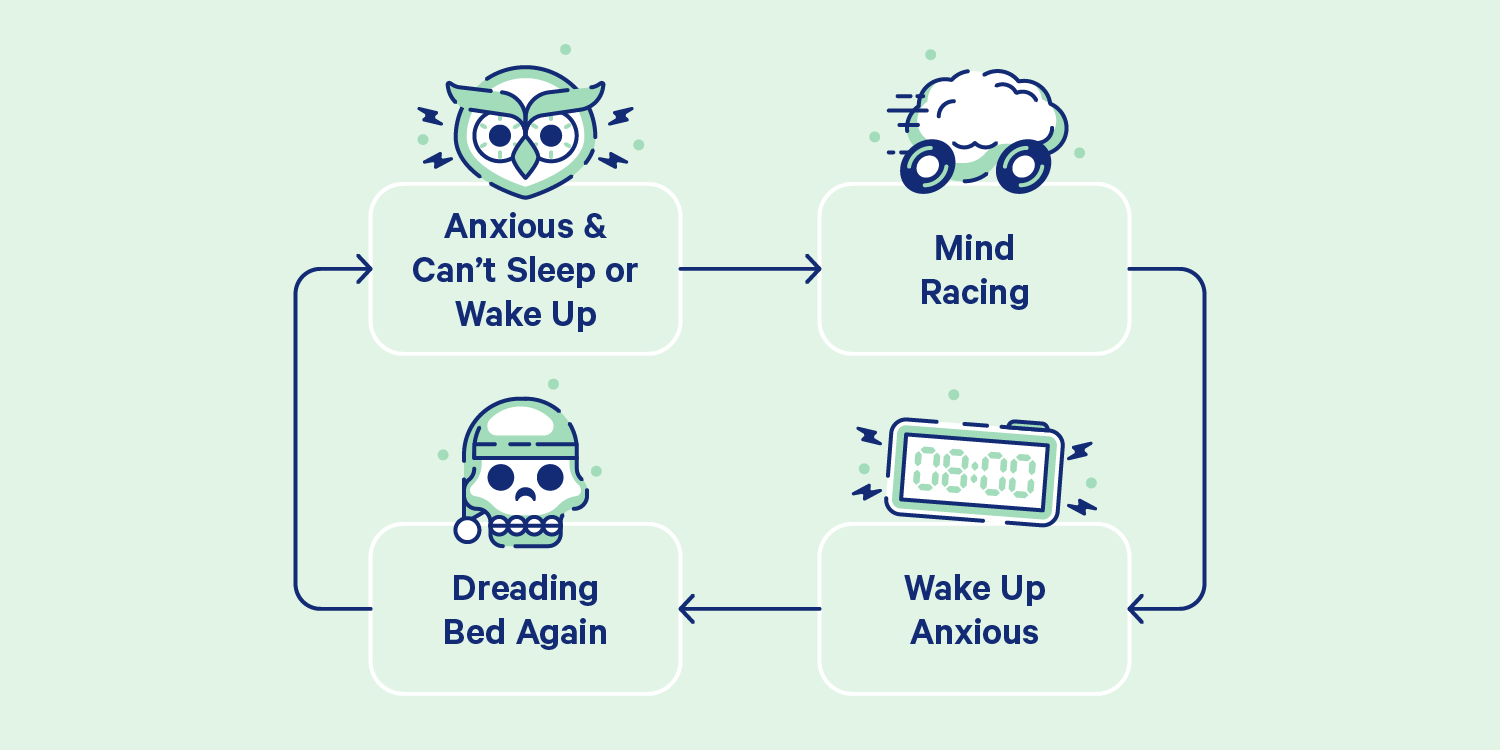
Anxiety can lead to an endless cycle of stress and poor sleep. If you often experience nighttime anxiety, it may be hard to tell whether you're having trouble sleeping because you're anxious or you're feeling anxious because you can't sleep.
According to research, sleep and anxiety go hand-in-hand. Having anxiety can cause sleeping problems and make it difficult to sleep, but sleep deprivation can also trigger anxiety. If you're unable to sleep, you may dread going to bed and waking up feeling even more sleep deprived.
UC Berkeley researchers suggest that the lack of sleep can ramp up regions in the brain that trigger excessive worry, which provokes further anxiety and makes sleep even more elusive
What Are the Symptoms of Nighttime Anxiety?
Symptoms of nighttime anxiety take on many forms, as it is experienced differently by everyone. Dr. Pierrette Mimi Poinsett, pediatrician and medical consultant for Mom Loves Best, says, "Before bedtime is no different than anxiety during the day. The difference is that you may be more aware of anxiety at night as fewer other stimuli are co-occurring."
While sleep anxiety is individual to each person, some of the most common symptoms include:
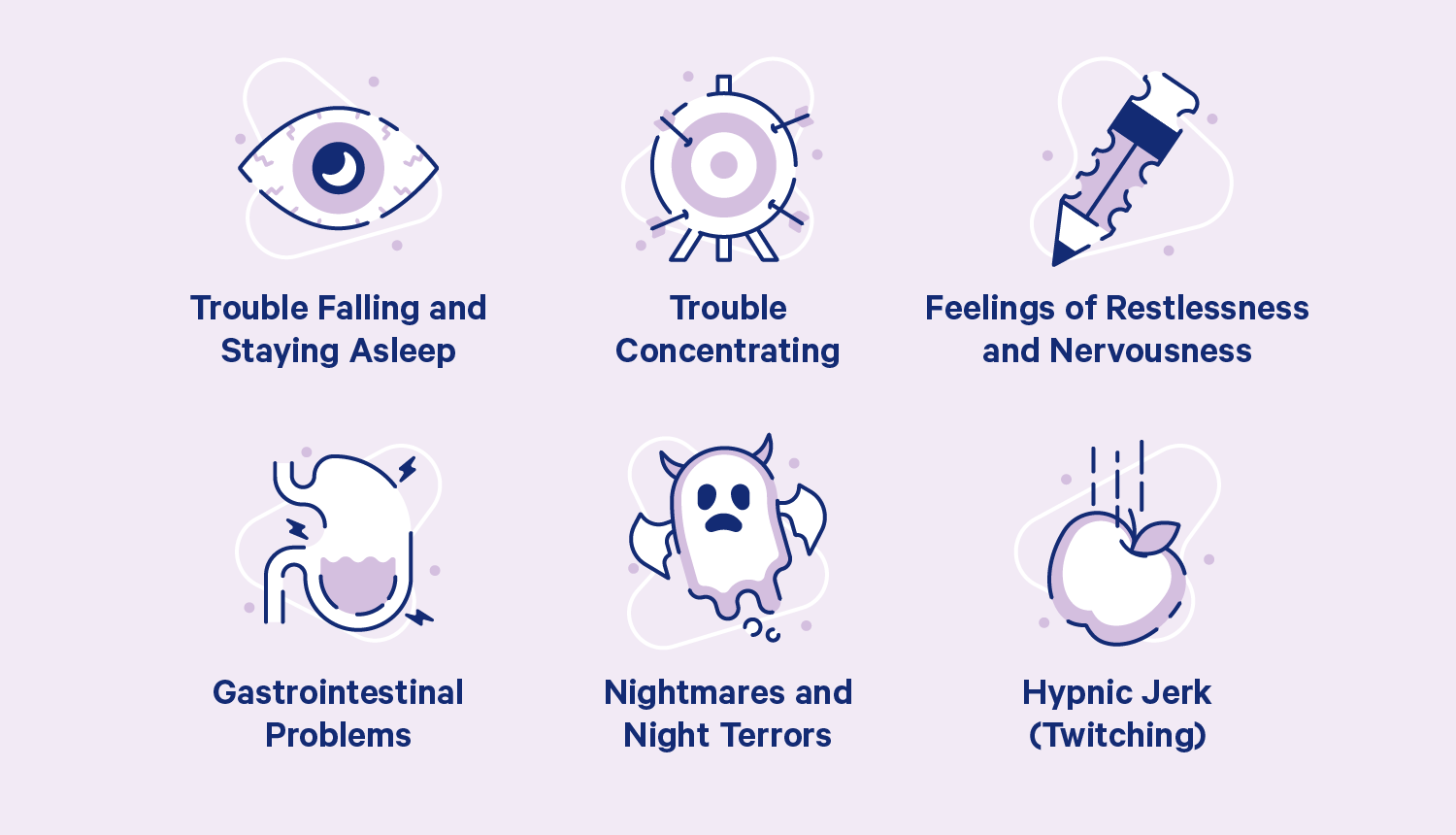
- Trouble falling and staying asleep
- Trouble concentrating
- Feelings of restlessness and nervousness
- Gastrointestinal problems
- Nightmares and night terrors
- Hypnic jerk (twitching)
Another symptom of sleep anxiety is panic attacks. This involves an episode of extreme fear that's characterized by a sense of doom, increased heart rate, sweating, dizziness, shortness of breath, and a feeling of detachment that could occur before or during sleep. After experiencing a nighttime panic attack, there can be anxiety about getting another attack, making it harder to fall asleep.
What Happens When Anxiety Interrupts Sleep?
When anxiety causes inadequate sleep, it can go beyond the tiredness of a regular all-nighter. Poinsett says that anxiety can be a trigger for sleep deprivation, creating a vicious cycle that can further affect your sleep pattern.
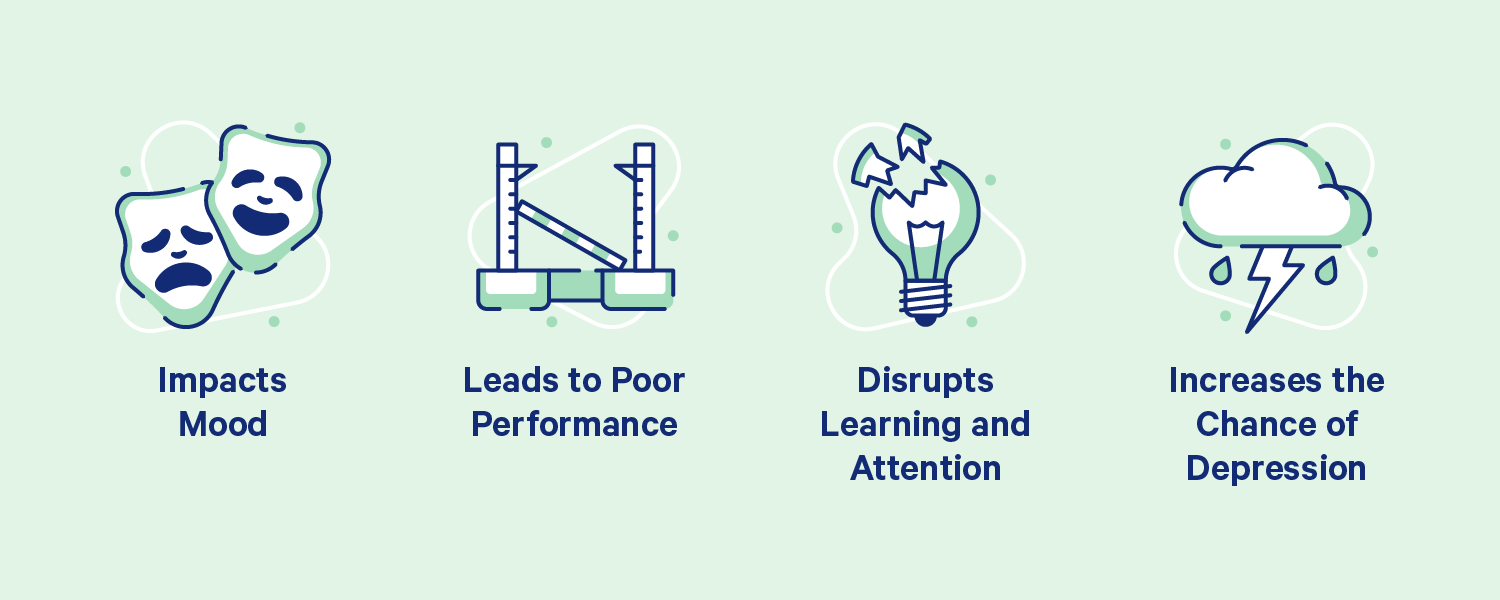
While the impact of sleep anxiety is largely individual, some common effects of sleep anxiety include:
- Negatively impacts your mood
- Leads to poor performance at work or school
- Disrupts learning and attention
- Increases chance of depression
- Reduces cognitive reaction times
A small study even found that those who have insomnia are four times more likely to develop depression.
In addition to mental health issues, those with sleep disorders can be at risk for other health problems, including heart disease, high blood pressure, stroke, diabetes, and obesity.
How Can I Overcome Anxiety at Bedtime?
If anxiety or disrupted sleep occurs often in your day-to-day life, these simple strategies can help you relax your body and mind and ease yourself into sleep. Changing your pre-sleep habits takes time and patience, but adapting to these changes may help you fall asleep with less sleep anxiety over time.
1. Practice Good Sleep Hygiene
Dr. Nikki Lacherza-Drew, licensed psychologist and owner of Vici Psychological Care, suggests engaging in proper sleep hygiene to help get better sleep. Lacherza-Drew says, "If you have a routine and engage in appropriate sleep hygiene on a consistent basis, your mind will be less likely to go down the rabbit hole of anxious thoughts."
Sleep hygiene refers to various habits that are necessary for good sleep quality. To practice good sleep hygiene, Lacherza-Drew suggests:
- Limiting screen time before bed
- No major physical activity or heavy meals close to bedtime
- No caffeine or alcohol near bedtime or after a certain time in the afternoon
Other easy ways to practice good sleep hygiene include:
- Soaking up the morning sun
- Limiting power naps to 20 minutes
- Keeping your bedroom dark and cool
- Following a consistent bedtime routine
2. Practice Meditation
According to Dr. Clara Lawson, medical doctor at USA Hemp, practicing meditation can help calm anxiety before bedtime. Additionally, research has shown that diaphragmatic breathing relaxation techniques can lead to significant reductions in anxiety before bedtime.
Start with as little as a few minutes of sitting quietly and focusing on your breathing. Learning to silence your mind and meditate can help navigate stress during the day and before bedtime. If you have trouble meditating, try these relaxing yoga poses to help your body prepare for sleep.
3. Exercise
Lawson also suggests using exercise to calm pre-bedtime anxiety because it reduces the production of stress hormones. Regular exercise has been shown to help people fall asleep faster and more soundly. Even a moderate-intensity workout like a brisk walk can improve sleep for those with chronic insomnia.
While getting exercise can be a great way to practice good sleep hygiene, Dr. Howard LeWine, editor in chief of Harvard Men's Health Watch, says, "You should avoid vigorous activity for at least one hour before bedtime." If you've been struggling to fall asleep, you may want to skip the late-night sweat sesh and opt for a morning or afternoon workout instead.
4. Set Aside Time for Winding Down
If you've been struggling with sleep anxiety, Dr. Fran Walfish, family and relationship psychotherapist, suggests "creating a routine that winds you down and gets you in the mood for sleep." This can include things like dimming the lights, listening to calming music, or taking a warm bath.
Walfish also suggests opting for activities like light reading in place of a TV or computer, as using a screen can " tend to rev up anxiety and excitatory thresholds versus relax and calm you down."
The best nighttime routine allows your mind and body time to slow down before you turn off the lights. Allot at least 30 minutes to take a bath, read a book, listen to a podcast, or play quiet music. These "transition rituals" can condition your brain to associate certain actions with preparing for sleep.
5. Avoid Stressful Activities Before Bed
Amber Weiss, licensed psychotherapist and founder of Transformative Mindset, says, "Creating some form of a transition from daytime to sleeping is highly recommended." According to Weiss, you can't expect the mind to go to sleep on demand. Instead, you need to allow time for the brain to transition, just like we transition to go outside or when we get home.
The goal is to reduce the nervous thoughts in your head so your mind is clear, calm, and positive before you head off to sleep. This can entail leaving the office, work, news, and social media exchanges for earlier in the day to create buffer time between work and sleep, setting yourself up for better rest.
6. Write Down Your Worries on Paper
According to Juanita Wells, director of clinical development at New Method Wellness, putting your thoughts down on paper can "help us remain accountable to ourselves, our feelings, our purpose, and plan."
Instead of letting thoughts and to-dos swirl around in your brain, write them down so that your brain has a game plan for the following day. Wells says that writing down your anxious feelings, especially through stream-of-consciousness journaling (writing whatever comes to mind), can help ease anxiety before bed.
In addition to calming pre-bedtime anxiety, research shows that journaling can also help you fall asleep more quickly. To get started journaling, just snuggle up with your notebook and some cozy pillows and let your thoughts take it away.
7. Avoid Lying in Bed Awake
If you're lying in bed for more than 20 minutes and still can't fall asleep, it might be time to give yourself a do-over. While it may feel counterintuitive, Lawson suggests leaving your bedroom to do a sleep-inducing activity, like having a cup of tea or reading a book. This conditioning, known as stimulus control, can reduce the time it takes to fall asleep.
If you're going to try stimulus control, it's important to remove yourself from your bedroom environment. This helps give you a mental reset when you try to fall asleep again.
8. Limit Screen Time
Did you know that our laptops, phones, and tablets emit blue light that tricks the brain into thinking the sun is up and suppresses melatonin? To combat this, try avoiding screens for one to two hours before bedtime to minimize sleep interruptions.
If you're unable to part ways with your phone before going to bed, you should consider using a blue light filter to minimize the amount of stimulating blue light you see before trying to hit the hay.
9. Set Your Environment
Controlling light, sound, and temperature in your bedroom can increase your chances of calming your mind and falling asleep easily. A sleep-friendly environment should be quiet, dark, and cool — between 60 to 67 degrees Fahrenheit, to be exact.
If light is keeping you up, using a dimmable glow light can be a great way to get yourself in the mood for sleep. Additionally, while white noise may be your go-to background sound to fall asleep, research has shown that pink noise can also help make it easier to focus on your sleep.
10. Get a Bed That Fits You
When you sleep on an uncomfortable mattress, pressure points build up on your body, causing you to toss and turn. A supportive mattress and pillow provide support to the contours of your body and neck, and keep you cool and comfortable for sleep.
For drool-worthy sleep at a price point that won't break the bank, you may want to check out the Casper Original Mattress. Engineered for cool, comfortable sleep, the Casper Original provides targeted layers of support and unique cooling perforations so you can spend less time counting sheep and more time catching Z's.
If you're looking for that sleeping-on-a-cloud experience, the Casper Nova Hybrid may be the right option for you. As our most plush mattress yet, the Casper Nova provides sturdy support with a luxuriously soft top layer so you can sleep worry-free.
11. Use a Weighted Blanket
Weighted blankets are a type of heavy blanket that typically weighs between 5 and 30 pounds. They're known for producing calming effects by mimicking the feeling of a hug using deep pressure stimulation. Because weighted blankets can help increase serotonin and melatonin while decreasing cortisol, they have been shown to promote feelings of calmness and peacefulness.
What Causes Anxiety Before Sleep?
According to clinical psychologist Emily Knott, "Anxiety before bedtime often takes the form of a phenomenon referred to in psychology as pre-sleep arousal."
Knott says that pre-sleep arousal may cause the body and nervous system to enter a state of heightened awareness that may take the form of "problem-solving, thinking about your own thoughts, focusing on stimuli in the environment such as noise and light, and ruminating about the consequences of not being able to sleep."
While there hasn't been extensive research conducted on sleep and anxiety, there are a few reasons why your anxiety may be worse at night. Here are possible causes.
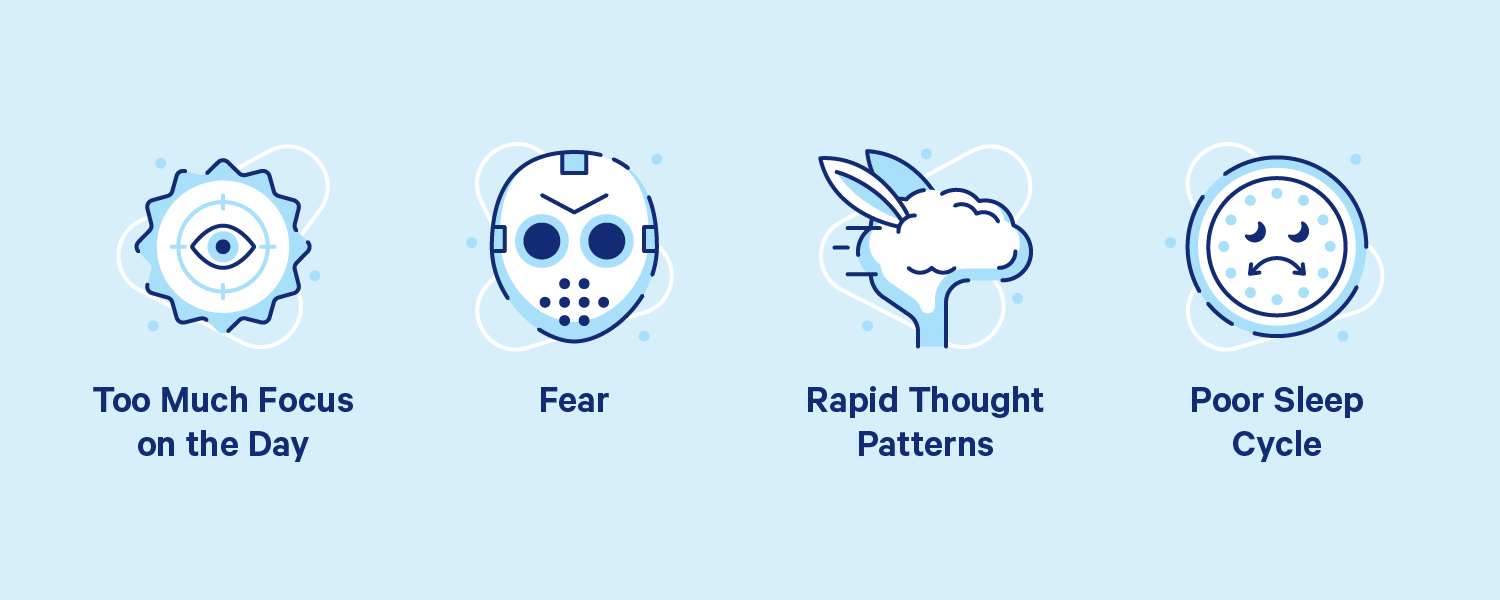
Reason #1: Too Much Focus on the Day
Nighttime anxiety can be caused by over-focusing on stress before sleep. Knott says that this is because "our body can perceive work stress, relationship issues, and social contact as dangerous, and prepare us to fight or flee." Being fixated on your worries during the day and anticipating stressful activities for the next day will make it more difficult for your mind to relax.
Reason #2: Fear
Some people feel scared, worried, and sad at night. The stress can cause your body to experience an adrenaline rush, which exacerbates your anxiety and prevents you from relaxing before bed.
Reason #3: Rapid Thought Patterns
Those who have anxiety tend to experience quick-moving thoughts that are difficult to calm. The longer those thoughts go on, the more anxious people feel. Poinsett says that these rapid thought patterns can turn into a vicious cycle that affects your sleep pattern throughout the week.
Reason #4: Poor Sleep Cycle
According to Lawson, insomnia and anxiety share a strong relationship, meaning sleep problems or insomnia can cause anxiety and vice versa.
If you've always been anxious or struggled to fall asleep, you may have developed a pattern of poor or interrupted sleep. This makes your body most susceptible to stress and insomnia.
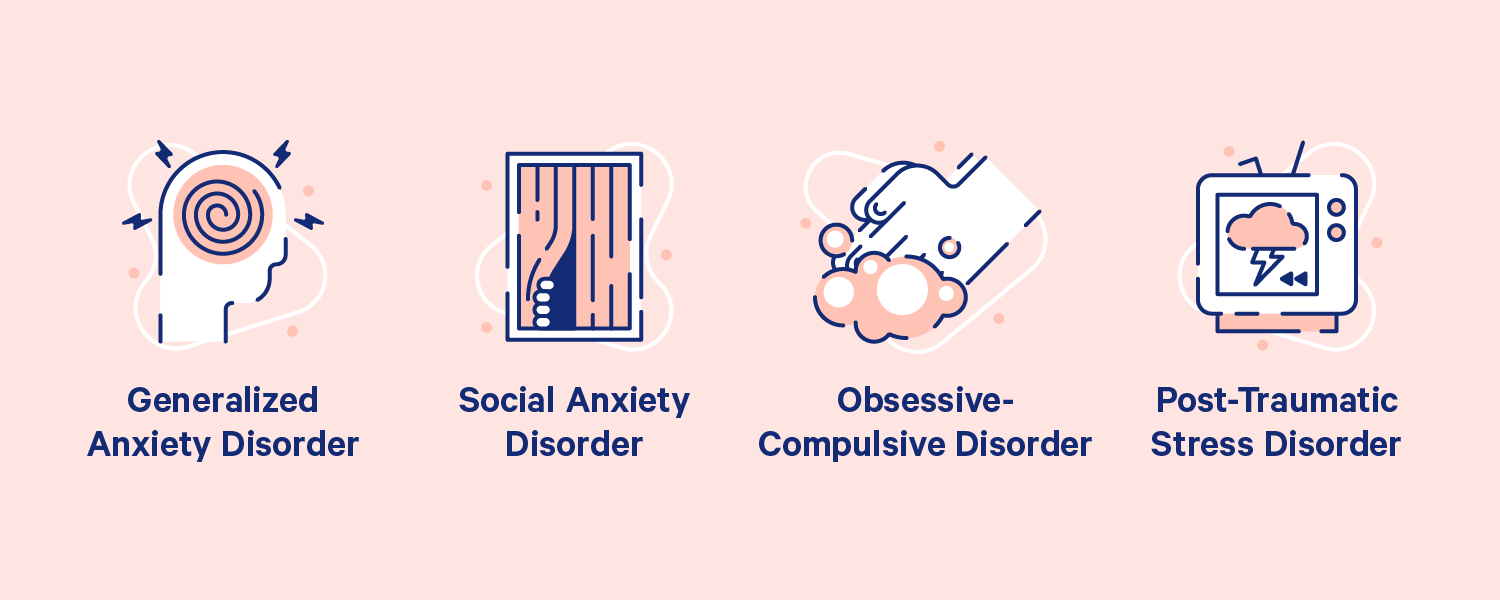
Types of Anxiety Disorders
Research also shows that sleep disorders occur in almost all psychiatric and anxiety disorders. Some of these include:
- Generalized anxiety disorder: Worry over everyday events, making it difficult to relax.
- Social anxiety disorder: The anticipation of social situations can often prevent sleep at night.
- Compulsive-obsessive disorder: Research suggests that intrusive thoughts and fears can keep people up when they're trying to fall asleep.
- Post-traumatic stress disorder: The constant re-experiencing of traumatic events can induce nightmares and rob people of sleep.
Sleep vs. Anxiety
While experiencing anxiety is a normal occurrence, it becomes a concern when it interferes with your ability to sleep. Anxiety at bedtime may be the result of an anxiety disorder or just from overall unrest. What we know so far is that sleeping problems can lead to anxiety, and anxiety can create more sleeping problems, creating a vicious loop.
If anxiety is affecting your sleep, it's possible that lifestyle changes and better sleep hygiene can help. If you are unable to overcome anxiety with these adjustments, it's best to speak to a health professional. No matter the method, it's important to alleviate the anxiety to get the sleep you deserve.
How to Get Rid of Anxiety at Night
Source: https://casper.com/blog/sleep-anxiety-guide/